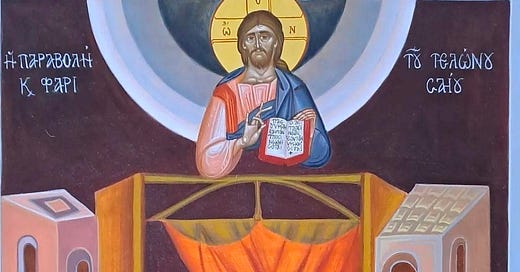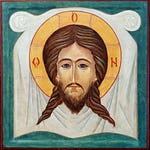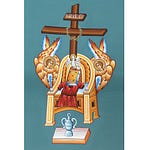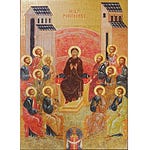You hear sometimes about the sin of Satan, the sin of the Devil. And with that sometimes is spoken the pride of Satan, the pride of the Devil. One might think, on that, how to do we know about the sin and pride of the Devil? The very fact that Satan thrice attempted to tempt Jesus in the desert bespeaks Satan’s pride. No angel with humility and fear of God would act that way. The prophet Isaiah attests to Satan’s pride when he says to Satan, “You said in your heart, ‘I will ascend to heaven; above the stars of God I will set my throne on high; I will sit on the mount of assembly in the far north; I will ascend above the heights of the clouds, I will make myself like the Most High.’” Satan thought himself like the Most High, that is, like God. Hence the very name of the Archangel Michael means “Who is like God?” and in battle Michael through down Satan who was the Day Star, even the prince of Angels, down to the earth to move from Star of the Day to Star of the darkness, from the prince of angels to the prince of this fallen world. All because of the sin of the Devil: exalting himself.
Saint Paul begins the passage of our Epistle today by attesting to the fact that Jesus Christ, in His ministry, did not exalt Himself. Paul writes, “Christ did not exalt Himself to be made a high priest, but was appointed by Him Who said to Him, “Thou art my Son, today I have begotten Thee.” Paul goes on to write that “In the days of His flesh, Jesus offered up prayers and supplications, with loud cries and tears, to Him Who was able to save Him from death, and He was heard for His godly fear. We have this contrast of exalting Himself (which Jesus did not do) and humbling Himself through genuine, heartfelt prayer (which Jesus did do).
This contrast perfectly matches with the Parable of the Pharisee and Tax Collector. To act like the Pharisee is to exalt oneself; it is to do things for reasons having to do with the ego, so as to receive praise, adulation, and recognition. To act like the Tax Collector is the opposite of that; the opposite of the Pharisee’s swagger: it is to humbly and without guile, in complete sincerity, ask for God’s mercy knowing one is a sinner. To know one is a sinner is to know of one’s ever-present inclination to sin; that is, one’s wretchedness, one’s concupiscence. To know one is a sinner is to know oneself honestly.
In preaching about concupiscence in this season of Lent, we have been guided by the First Epistle of S. John, 2:15-17, which reads “Do not love the world or the things in the world. If any one loves the world, love for the Father is not in him. For all that is in the world, the lust of the flesh and the lust of the eyes and the pride of life, is not of the Father but is of the world. And the world passes away, and the lust of it; but he who does the will of God abides for ever.” That word “lust” is synonymous with concupiscence. We have reflected on two of the three kinds of concupiscence thus far: that of the flesh, and that of the eyes. The third and final kind, as described in the spiritual literature of the Church and S. John, is “pride of life.” This pride of life, along with concupiscence of the flesh and of the eyes, is what drives us towards sin. Hence the importance for us to understand it and acknowledge it in our lives, against the desire of the Devil for us to ignore it or think concupiscence is nothing.
Pride of life is that empty swagger by which we try to deceive ourselves and others into the belief that we are just such a fine fellow. But it is worse than that. This form of concupiscence seeks to put self in the place of God. By it, we forget that God alone is the source of whatever good is in us. We take all our good qualities to ourselves and so become self-complacent. This is a kind of narcotic in that this blunts our sense of sin and distorts our spiritual vision; it leads immediately to vanity, that inordinate self-satisfaction founded on emptiness. And to feed that, we then desire to do and obtain those things which appeal to self without regard to the will of God; thus it is a primary source of sin and essentially an assertion of independence.
Jonah, despite knowing God’s will, went rogue. He was self-deluded by a sense of his independence which has in it a kind of obliviousness: on the boat, even in the whale, and even as he proclaimed to the Ninevites that they must repent. All of this was done with little more than passing regard for the will of God, to say nothing of humility. The long, florid speech Jonah makes while in the belly of the whale is a perfect match to the florid words of the Pharisee spoken to God: showy, seeking attention and recognition for its impressive composition, full of self-regard about just how much he is full of thanksgiving–and basically verbose, wordy. All Jonah had to say, whether in the whale or on the boat or on land in the heat, was “God, be merciful to me a sinner!” the words of the Tax Collector. All he had to say was the Jesus Prayer, the Prayer of the Heart: Lord Jesus Christ, have mercy upon me, a sinner. Simple prayer, not ornate and showy prayer, is what God wants, because He already knows everything about us and everything we have done. He wants to see our humility and genuine desire for His mercy, which He Himself yearns to give.
Let us not be deceived into thinking a course of action, because it is pleasing to us, is automatically pleasing to God. Let us recognize in ourselves the inclination toward this pride of life, that swagger of complacently seeking praise and recognition, the self-deception of our own awesomeness. Let us acknowledge that by pride of life we imitate the sin of the Satan, the ancient enemy of all that is good; yet whose dastardly and subtle power has been dismantled and destroyed forever by Christ Jesus our Lord, by His Cross and Precious Blood, Who lives and reigns with the Father and the Holy Ghost, one God in glory, unto the ages of ages. Amen.











Share this post